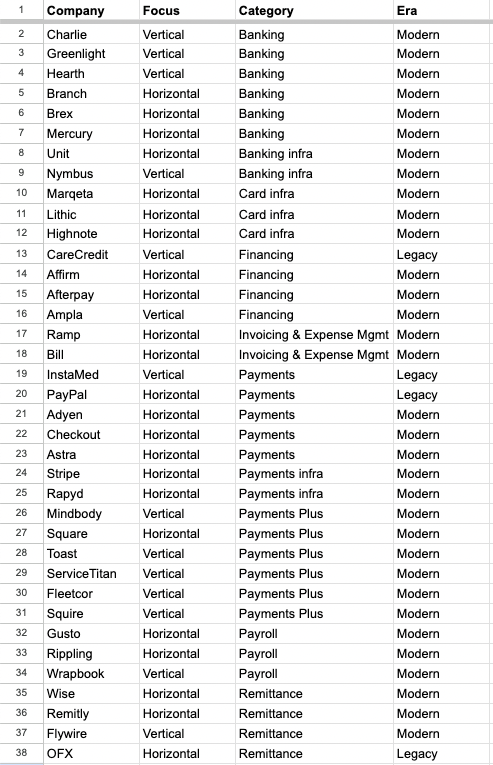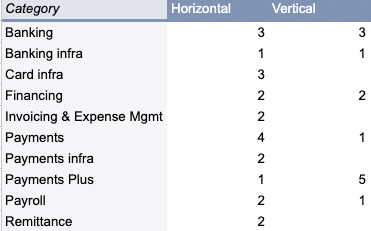Horizontal vs. Vertical
This is a post about a common thread that keeps coming up in conversations lately -- companies thinking through their future and whether they should target a vertical(s), going after targeted sub-sectors.
Before we dive in, let's clarify what I mean by 'horizontal' and 'vertical' fintech in this case. Horizontal provides services that cut across various industries or markets think, like PayPal or Square. On the other hand, vertical focuses on a specific sector or niche, offering tailored solutions for unique problems, like Toast or InstaMed. I'm not referring to the stack or value chain itself (which Saira covers really well in this presentation).
There are obvious pros and cons to both approaches. Horizontal companies can reach a larger market but may have a tougher time differentiating themselves from the competition. Vertical companies can focus on meeting the specific needs of their target market, but they may have a smaller addressable market. The decision between starting horizontally or vertically is not always clear-cut but should largely depend on the founding team's DNA. This shouldn't be taken lightly, as one of the most critical and under-appreciated aspects in fintech is thoughtful customer selection. The decision to shift from horizontal to targeting specific verticals later likely comes down to the likelihood and ability to execute well (aligning growth teams and product teams for instance, defining proper roadmap, resourcing it, branding/customer perception, etc.). I think ones ability to do so will also be determined by how close you are to the center of your customers operations. For instance, Toast is the heart of restaurants at this point. Everything is tailor made for them. I think it'll be tougher for them to expand to a new vertical than someone who serves an important but less central role to their customers operations, like Bill for instance.
I cherry-picked some companies in various categories to think about. Let me know if you want to contribute, and I'll grant you access to the sheet.


Main takeaways at first glance:
- We can be confident in the ability to build big 'venture-sized' businesses in most categories by starting vertically or horizontally. Except for Banking-first companies (represented in the category "Banking.") That's the category I'm least confident in based on historical outcomes.
- I think the 'embedded banking' thesis is still valid, justifying its place as one of the hottest fintech theses in modern times. Therefore, the question is the path. Can starting out as a vertical neo(bank) result in a venture outcome, or will it often be better to back into banking through vertical business software (à la Payments Plus)? I'm inclined to believe the latter at this point, but these are fun thought exercises, and it'll be interesting to see how things progress over the next five years. I should also clarify that there's some subjectivity in labeling. I'm considering Mercury as horizontal, given they serve SMBs across sectors (I even use them for my wife's children's books sales, a very, very, very small business) even though they started out focusing on venture-backed startups broadly.
- There are far more breakout companies that are more horizontal than vertical.
- It's more reasonable to expect a Bill to figure out how to expand product and GTM focus at specific verticals than to expect Toast to expand.
- When it comes to fintech, I think the harder you make a market map makers life, the better (more valuable and durable you'll be). Make it hard to determine if you're vertical or horizontal focused, make it hard to define you just as infra or app, make it hard to stick you in a single category, and even make it hard to categorize you just as a fintech company. Modern companies like Wise, Ramp, and Rippling are good examples.
- Although not on the list, obviously, I think it's interesting to think about SVB. We could have considered them to be vertical in this context. They grew deposits rapidly, they had great brand recognition with their target client base, and they were ultimately able to get a valuable flywheel going. Lots of pros. Extreme concentration as well, obviously.
Obvious disclaimer: Strictly for getting some thoughts down and drumming up discussion. Fully recognize it's a cherry-picked list, doesn't include thorough analysis around money in, valuations, past failures, etc.